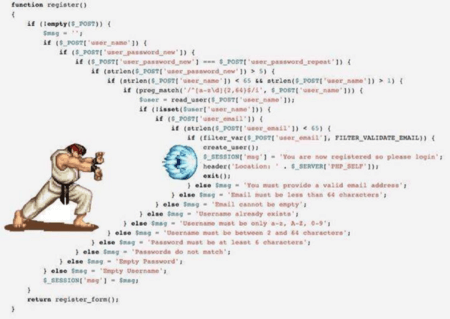今日推薦開源項目:《即刻 CopyTranslator》
今日推薦英文原文:《Stop Using Else in Your Programs》

今日推薦開源項目:《即刻 CopyTranslator》傳送門:GitHub鏈接
推薦理由:讀英文文檔的時候基本上都會需要一個翻譯器來輔助——即使讀得多了也沒準就有啥詞給突然忘了呢。這個項目可以讀取你的剪貼板,當你複製一段想要翻譯的文字之後就會響應將其自動翻譯,不需要額外的粘貼到其他翻譯器上,也克服了劃詞翻譯對大段文字的不適應,作為提升工作效率的道具來說相當合適,也能夠在平時作為單純的劃詞翻譯來練習閱讀能力。

今日推薦英文原文:《Stop Using Else in Your Programs》作者:Joey Colon
原文鏈接:https://medium.com/better-programming/why-you-need-to-stop-using-else-statements-5b1fd09dea9e
推薦理由:在多個條件判定時一種比起堆疊 if-else 來說更整潔的寫法
Stop Using Else in Your Programs
A practical introduction to guard clauses
When I first began programming, I wish someone would have told me about a few different concepts to think about when writing my first website.One of the mistakes I fell into when starting was overusing the else keyword when writing conditionals. This is something that I find plenty of others doing in their own code as well, so I thought I should shed some light on the topic.
A disclaimer; my view on this topic is purely subjective.
In some situations, you may not be able to apply this type of approach to your code. Sometimes, the solution is to use the else keyword. This post is to inform people of an alternative approach to structuring logic.

Indent Hadouken
Guard Clauses
According to Wikipedia, a guard clause is a check of integrity preconditions used to avoid errors during execution.Let』s break down that definition into layman』s terms. We perform a check of integrity preconditions (at the beginning of our code) to avoid any bugs during the main flow of our logic.
In the perfect flow (when validation is correct), we want the main logic of our program to be after all of the validation checks.
Let』s imagine that we run a website where we have a premium purchase area that is restricted to paying customers only and only open after 12 pm.
<?php
if ($user != null) {
if (time() >= strtotime('12 pm')) {
if ($user->hasAccess(UserType.PREMIUM)) {
if ($store->hasItemsInStock()) {
// the content a premium user user should be able to see when the store is in stock
// after 12pm.
} else {
return 'We are completely sold out.';
}
} else {
return 'You do not have premium access to our website.';
}
} else {
return 'This section is not opened before 12PM';
}
} else {
return 'You are not signed in.';
}
While this is an approach to flow through the conditionals, the else keywords become difficult to follow even when we only have a small number of them.
This is a trivial example of conditional logic but, out in the wild, imagine trying to navigate a class that has much more complex logic. Coding through this standard, in my opinion, is not sustainable and we should do better.
With guard clauses, we will want to follow this framework:
<?php
if (condition1()) {
return ...;
}
if (condition2()) {
return ...;
}
// Input is valid.
doSomething();
<?php
if ($user == null) {
return 'You are not signed in.';
}
if (time() < strtotime('12 pm')) {
return 'This section is not opened before 12PM';
}
if (!$user->hasAccess(UserType.PREMIUM)) {
return 'You do not have premium access to our website';
}
if (!$store->hasItemsInStock()) {
return 'We are completely sold out.';
}
// the content a premium user user should be able to see when the store is in stock
// after 12pm.
This approach captures the same exact logic flow but, in my opinion and in others as well, this is a much cleaner approach when tackling conditional logic.
Conclusion
When coding, we should always keep the question in-mind of: 「How easy will this be to maintain 6 months down the line?」Creating solutions to a problem at the current time is great. But what about in the future? Not building software with the future in-mind is silly.
It has personally caused me to entirely rewrite whole features from scratch because of how much technical debt I accumulated over time through numerous band-aid fixes.
Utilizing guard clauses will set your future self/team up for success for when new requirements are added to your program.
下載開源日報APP:https://openingsource.org/2579/
加入我們:https://openingsource.org/about/join/
關注我們:https://openingsource.org/about/love/
